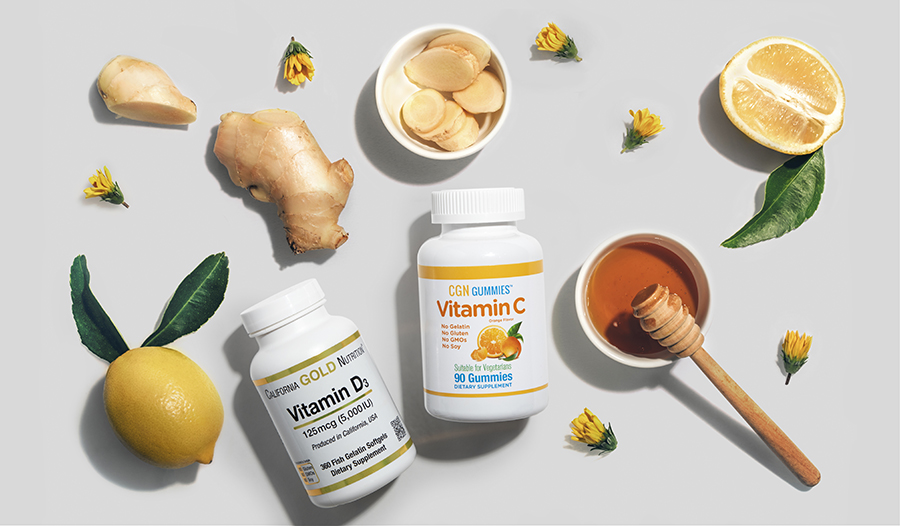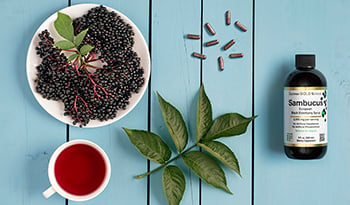Immunity 101: How it Works + Practices to Bolster our Body's Defenses

How Does the Immune System Work?
Everyone knows the immune system protects our body from infections; exactly how it works is more of a mystery. There are two parts to the immune system: the innate and adaptive immune systems. Each part is composed of unique components and functions in different ways to protect our bodies.
What is Innate Immunity?
The innate part of our immune system includes nonspecific defenses like the fact that our skin is slightly acidic, which prevents bacteria from growing on it. Another great example of innate immunity is the mucous that lines our mouth. This slimy substance contains enzymes that kill anything bad that we eat.
What is Adaptive Immunity?
The adaptive part of our immune system is much more specific and strategic. Rather than killing whatever it comes in contact with like the innate part of the system, this sophisticated machine includes specific cells like T and B lymphocytes. These cells have specific receptors that recognize when foreign things enter the body like viruses or bacteria.
The T cells have specific receptors that help them identify these pathogens and mount an attack against them from the immune system. B cells are interesting as they can cover pathogens with antibodies much like we cover French fries with ketchup, to make them tastier. When a bacteria or virus is covered in antibodies, they become “very tasty” to the immune system and can easily be destroyed. End game: our body has protected us and we don’t get sick!
What Effect Does the Change in Seasons Have on My Immune System?
Some research points to a decrease in daylight as seasons change correlating with immune function. With shorter days, some of the cells in the innate immune system don’t function as strongly as they would with longer exposure to sunlight. This research also showed a larger increase in pathogenic bacteria, which makes sense since part of the immune system isn’t functioning as strongly as it should.
Can Stress Affect My Immune System?
Most people report increased stress around the holiday season. Increased stress usually means an elevation in our stress hormone cortisol. This elevation in cortisol has different effects on our immune system depending on how long the stress lasts. With short-term stress, the innate part of our immune system is stimulated while the adaptive is suppressed, altering our immune system and possibly leading to less protection for the body.
Elevated cortisol stimulating the immune system can lead to a high inflammatory response in the body. Often the release of pro-inflammatory cytokines comes with high cortisol. These molecules can increase the level of intensity of an inflammatory response, signaling our immune system to deploy or create immune cells. A high inflammatory response has been theorized to be the foundation for many things that can lead to poor health and/or fatigue as deploying many immune cells uses a lot of energy!
How Does Diet Affect Immune Health?
Remember that old saying, “you are what you eat”? Well, it’s true! Our diet plays a big role in the health of our immune system. Micro (think vitamins and minerals) and macro (think proteins, carbohydrates, and fats) nutrients play a role in supporting a healthy immune system. Many minerals like zinc are key for supporting both the innate and adaptive immune systems.
Other vitamins like vitamin E can provide antioxidant support to prevent damage to the body when we ingest junk foods, which naturally stimulate a high inflammatory response. Vitamin E can also help with the creation of immune components including cells themselves.
What Lifestyle Adjustments Can I Make to Support My Immune System?
Practice Stress Management
Adopting good stress management techniques can support healthy levels of cortisol and can go a long way to support a healthy immune system. There are various forms of stress management including physical exercise, and then more cognitive forms like meditation or other mindfulness practices. Just like a skill, stress management takes time to incorporate into your life. So be kind to yourself as you work on it.
Eat a Nutrient-Dense Diet
Nutrient-dense diets including whole foods and a variety of types of foods are great in supporting a healthy immune system. The body can glean so many more nutrients from a piece of chicken and a salad than a bowl of sugary cereal.
Get Quality Sleep
Sleep also plays a huge role in immune function. Being mindful of your natural circadian rhythm is key to producing a healthy amount of energy. Lack of quantity and quality of sleep can disturb our immune system, leading to increased susceptibility to infection. The quality and quantity of sleep matters and can be supported by practicing good sleep hygiene. This practice includes sleeping in a dark room, avoiding electronics before bed, and going to bed before 11 p.m. Natural sleep aids, such as magnesium and melatonin, may also help encourage a healthy sleep cycle.
What Supplements Can I Take to Support My Immune System?
Many supplements can help support a healthy immune response including echinacea, vitamin D, zinc, probiotics, and vitamin C.
1. Echinacea
Echinacea is a botanical and often is a group name for a few different species of plants. Echinacea angustifolia, Echinacea pallida, and Echinacea purpurea are common forms of these plants. Echinacea has been used worldwide for its ability to support the immune system. Specific active components in the plant are called dichroic acid and echinacoside that help echinacea do its job.
Echinacea fun fact: it may decrease the length of the common cold. Research has also pointed to its positive effect on supporting a healthy inflammatory response. This botanical has been studied to stimulate the innate part of the immune system, resulting in a heightened defense in the body against pathogens. Some research has shown that forms of echinacea can also have a positive effect on the adaptive part of the immune system.
2. Vitamin D
Vitamin D is a key nutrient needed for healthy immune function. It is naturally made in the body through our skin’s contact with UV light. With indoor living and avoiding the sun, popular practices in the modern world, many are deficient in this essential vitamin. Vitamin D plays an important role in breaking down our food to release key nutrients. It can specifically support healthy sugar break down, theoretically supporting a healthy inflammatory response in the body.
Fun fact: our immune cells have some ability to create vitamin D! This key vitamin helps to support healthy innate and adaptive immune function. There are also theories that low vitamin D can lead to increased susceptibility to infections and/or contribute to immune hypersensitivity/reactivity.
3. Zinc
Zinc is a key mineral essential for a healthy immune system. Zinc deficiency and its correlation with immune function was discovered by scientists in the 1960s. Since this discovery, countless research studies exploring zinc’s many benefits have been done. Zinc is like a messenger giving the correct signals to both the innate and adaptive immune system so they can “talk” and function efficiently.
Zinc is also key to creating antibodies. Remember that earlier we spoke about the immune system “making pathogens tastier” by covering them with antibodies. This zinc-dependent process is key for other immune cells to kill infectious invaders like bacteria or viruses.
4. Probiotics
Probiotics have been shown over the years to support a healthy gut, but what does it have to do with immunity? Much of your immune system is in your gut! These helpful bacteria support a healthy innate and adaptive immune response. One of the neat features of probiotics is they may physically block a pathogenic bacteria from binding to your gut. This action may help to avoid infections.
Many probiotics also support a healthy inflammatory response, essentially helping the immune system decide how strong of a response it needs to mount. A healthy inflammatory response is the key to a healthy immune system.
5. Vitamin C
Vitamin C is a water-soluble vitamin key for proper innate and adaptive immune function. Vitamin C has a unique function as an antioxidant that can be used to repair the lining of the gut. This may help to ward off pathogens similar to the action of probiotics, preventing the binding of these pathogens to the gut.
Vitamin C can also help cells of the innate immune system create something called reactive oxygen species or ROS. This chemical can be secreted by immune cells and can kill pathogens.
Thankfully at a time when our immune systems are more vulnerable, there are lifestyle and supplement best practices that can support our system when it needs it the most!
References:
- Yatim KM, Lakkis FG. A brief journey through the immune system. Clin J Am Soc Nephrol. 2015;10(7):1274-1281. doi:10.2215/CJN.10031014
- Gassen J, Proffitt Leyva RP, Mengelkoch S, et al. Day length predicts investment in human immune function: Shorter days yield greater investment. Psychoneuroendocrinology. 2019;107:141-147. doi:10.1016/j.psyneuen.2019.05.011
- Segerstrom SC, Miller GE. Psychological stress and the human immune system: a meta-analytic study of 30 years of inquiry. Psychol Bull. 2004;130(4):601-630. doi:10.1037/0033-2909.130.4.601
- Brown MM, Bell DS, Jason LA, Christos C, Bell DE. Understanding long-term outcomes of chronic fatigue syndrome. J Clin Psychol. 2012;68(9):1028-1035. doi:10.1002/jclp.21880
- Childs CE, Calder PC, Miles EA. Diet and immune function. Nutrients. 2019;11(8):1933. Published 2019 Aug 16. doi:10.3390/nu11081933
- Missiroli, S., Genovese, I., Perrone, M., Vezzani, B., Vitto, V., & Giorgi, C. (2020). The role of mitochondria in inflammation: From cancer to neurodegenerative disorders. Journal of clinical medicine, 9(3), 740.
- Besedovsky L, Lange T, Haack M. The sleep-immune crosstalk in health and disease. Physiol Rev. 2019;99(3):1325-1380. doi:10.1152/physrev.00010.2018
- Worthen M, Cash E. Stress Management. In: StatPearls. Treasure Island (FL): StatPearls Publishing; August 29, 2020.
- Drewnowski A, Dwyer J, King JC, Weaver CM. A proposed nutrient density score that includes food groups and nutrients to better align with dietary guidance. Nutr Rev. 2019;77(6):404-416. doi:10.1093/nutrit/nuz002
- Ding G, Gong Y, Eckel-Mahan KL, Sun Z. Central circadian clock regulates energy metabolism. Adv Exp Med Biol. 2018;1090:79-103. doi:10.1007/978-981-13-1286-1_5
- Zhai Z, Liu Y, Wu L, et al. Enhancement of innate and adaptive immune functions by multiple Echinacea species. J Med Food. 2007;10(3):423-434. doi:10.1089/jmf.2006.257
- Gaspar RC, Botezelli JD, Kuga GK, et al. High dosage of vitamin D regulates the energy metabolism and increases insulin sensitivity, but are associated with high levels of kidney damage. Drug Dev Res. 2017;78(5):203-209. doi:10.1002/ddr.21394
- Aranow C. Vitamin D and the immune system. J Investig Med. 2011;59(6):881-886. doi:10.2310/JIM.0b013e31821b8755
- Wessels I, Maywald M, Rink L. Zinc as a gatekeeper of immune function. Nutrients. 2017;9(12):1286. Published 2017 Nov 25. doi:10.3390/nu9121286
- Shankar AH, Prasad AS. Zinc and immune function: the biological basis of altered resistance to infection. Am J Clin Nutr. 1998;68(2 Suppl):447S-463S. doi:10.1093/ajcn/68.2.447S
- Yan F, Polk DB. Probiotics and immune health. Curr Opin Gastroenterol. 2011;27(6):496-501. doi:10.1097/MOG.0b013e32834baa4d
- Carr AC, Maggini S. Vitamin C and immune function. Nutrients. 2017;9(11):1211. Published 2017 Nov 3. doi:10.3390/nu9111211
DISCLAIMER:This Wellness Hub does not intend to provide diagnosis...

















































































 Table of Contents
Table of Contents




















